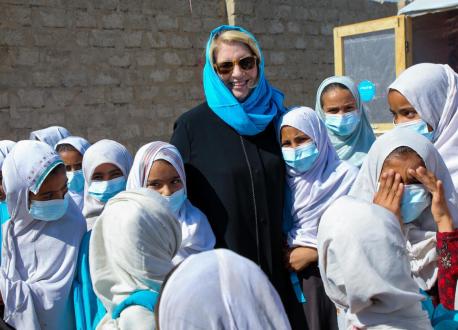
Making a Difference in
Afghanistan
This Ramadan
Amid a devastating humanitarian and economic crisis, UNICEF is bringing much-needed relief to children in Afghanistan.
Around the world, Muslim communities are coming together to commemorate the holy month of Ramadan through prayer and fasting. But millions of children and families in Afghanistan are unable to have a proper meal to start and break their fast. They are in the grip of a devastating humanitarian and economic crisis.
Economic collapse has pushed food prices out of reach for many families in Afghanistan
More than 64 percent of people in Afghanistan cannot meet their basic needs due to cascading crises that have shifted from conflict to economic shock. Widespread unemployment combined with soaring prices of basic commodities is putting food and other necessities out of reach for many families.
Nearly 20 million people in Afghanistan are likely to experience emergency levels of food insecurity in 2023. In 15 out of 34 provinces, the number of children suffering from severe wasting, the most life-threatening form of malnutrition, is above 3 percent, with 875,000 children under age 5 in need of lifesaving nutrition treatment.

In 2023, UNICEF plans to treat 875,000 children under 5 for severe wasting in Afghanistan
UNICEF is on the ground in Afghanistan, scaling up nutrition programs to reach more acutely malnourished children with the supplies and services they need to survive and thrive.
Children like 11-month-old Fatima, who was sickly and undernourished when parents brought her to Speen Boldak hospital, a UNICEF-supported health facility in Kandahar province. After a nutrition screening, Fatima's parents were given a supply of Ready-to-Use Therapeutic Food, a nutrient-rich peanut paste that can restore a severely malnourished child to health in a matter of weeks.

Emergency cash assistance lets families prioritize their spending
To help Afghan families pay for necessities, UNICEF provides emergency cash transfers through a donor-funded program. The temporary income allows families to allocate funds according to their most urgent needs: food, fuel for heating, warm clothing, blankets, materials for shelter repairs, health care, transportation for their children to go to school. It also helps families avoid loans and a spiral of debt while reducing the risk of child labor and child marriage.
Women and girls in Afghanistan continue to face a systematic attack on their human rights, including the exclusion of girls from high schools and women from the workforce. UNICEF and other UN agencies remain committed to delivering independent, principled lifesaving assistance to all who need it: women, children and men.
None of this work would be possible without the sustained support of donors and partners committed to supporting the rights of children not just in Afghanistan but around the world to grow up healthy and hopeful for a brighter future.
HOW TO HELP
There are many ways to make a difference
War, famine, poverty, natural disasters — threats to the world's children keep coming. But UNICEF won't stop working to keep children healthy and safe.
UNICEF works in over 190 countries and territories — more places than any other children's organization. UNICEF has the world's largest humanitarian warehouse and, when disaster strikes, can get supplies almost anywhere within 72 hours. Constantly innovating, always advocating for a better world for children, UNICEF works to ensure that every child can grow up healthy, educated, protected and respected.
Would you like to help give all children the opportunity to reach their full potential? There are many ways to get involved.



